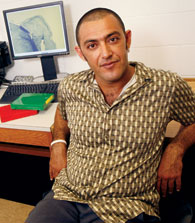by Jeff Roberts
Easing the emotional strain of crippling memories

While memories can be sweet, they can also be savage. Survivors of violence, rape or abuse can suffer post-traumatic stress disorder (PTSD), which forces them to relive their ordeal over and over. These flashbacks can be so debilitating that many PTSD sufferers find it hard to maintain relationships, hold jobs and—in extreme cases—simply leave the house. Now, however, the pioneering work of Karim Nader promises relief from trauma.
His experiments suggest damaging memories can be stripped of their potency by administering a common blood pressure drug, propranolol, as a traumatic event is being recollected. Nader’s findings, which were published in Nature, have caught the attention of the BBC and 60 Minutes. His work also earned him a place in the Globe and Mail/ Caldwell Partners’ prestigious “Canada’s Top 40 Under 40” awards.
Nader’s work hinges on the idea that memories, regardless of whether old or new, are unstable during the recollection process. While a person is actively recalling a memory—as when PTSD sufferers revisit their trauma—the memory is removed from storage in the brain, and then needs to be restored. (The process is analogous to active computer data being transferred from a hard drive to RAM.) Following recollection, the memory is “reconsolidated,” or reprinted, back into a stable form. During this dynamic state, memories can be manipulated.
Working with rats, the 39-year-old, Cairo-born researcher rediscovered the obscure fact that emotional memories can undergo reconsolidation in the amygdala, the clusters of neurons housing a memory’s emotional component. When drugs block reconsolidation, the animals behave as if the emotional event wasn’t very important; subsequent work has shown that propranolol has the same effect in humans. By administering propranolol while a PTSD victim is recalling a horrific event, the remembered trauma is rebranded with the emotional weight of an ordinary bad memory, one that is not debilitating. The memory remains as vivid as before; only its disproportionately traumatic import is lessened.
Nader, who joined McGill’s Department of Psychology as an associate professor in 2001, is careful to clarify he isn’t trying to erase memories or create a utopian drug that will purge the world of bad experiences. Fear, guilt, anger and other unpleasant emotions are a healthy part of normal life. “These are things that drive our lives. Every day we make decisions based on fear of what might happen,” says Nader. “We just want to turn the traumatic memory down so it’s not so overwhelming and can then be treated with traditional forms of therapy.”
The implications of Nader’s work are enormous. With colleague Alain Brunet, a clinical psychologist in the Department of Psychiatry, he has already shown propranolol can alleviate PTSD. Some research subjects responded so positively they’ve been able to return to the workforce—a personal victory once thought impossible. Other results are less life-altering, but no less profound; even test subjects suffering from 30 years of PTSD exhibited a dramatic decrease in physical symptoms (sweaty palms, racing heart) while recalling traumatic incidents.
“Any effect is extremely encouraging,” says Nader, who plans to explore how varying propranolol dosage might help patients further soften their traumatic memories. “Just bringing these body reactions back down to normal is really an amazing thing.”
Professor Karim Nader holds a William Dawson Chair at McGill. He is also an Alfred P. Sloan Fellow and a recipient of a CIHR New Investigator Award.
